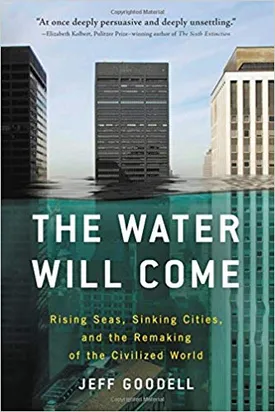The Water Will Come: Rising Seas, Sinking Cities, and the Remaking of the Civilized World by Jeff Goodell
The Water Will Come, written by Jeff Goodell, is a compelling and sweeping examination of humanity's future in a world of rapidly rising seas. Goodell explores both the immediate and long-term effects that higher sea levels will have on our global society, including the reshaping of coastal cities and the displacement of millions of people.
Throughout The Water Will Come, Goodell offers readers a poignant glimpse into the lives of those already feeling the consequences of climate change. He visits cities rushed by floods, remote archipelagos battered by rising ocean levels, and indigenous communities who have stories to tell of how their cultures are transformed by forces they never anticipated. Through in-depth research and interviews with global leaders and scientists, Goodell paints a vivid and cautionary tale of how higher sea levels will impinge on our daily lives in the future.
The author begins his journey by visiting Miami, Florida: a waterfront city among the most vulnerable to flooding as the planet continues to struggle with rising seas. From there Goodell takes us along his travels to other coastal cities including Jakarta, Rotterdam, Naples, London and New York—all places preparing for dramatic shifts in their geography and their communities. Along the way, he speaks with engineers and architects striving to create modifications and raise infrastructure to protect these cities from rising waters.
Of great concern to Goodell are the effects of sea-level rise in regards to public health. Goodell takes us to present-day South Pacific islands, where inhabitants are already evacuated due to saltwater intrusion. He demonstrates how island nations and entire populations of indigenous people in South America, Australia, and Bangladesh are already feeling the consequences of sea-level rise, as their land and their homes have begun to vanish into the open waters.
At the same time, Goodell paints a candid and honest portrait of human behavior in the face of climate change, including rampant political gamesmanship and the diminishing of public interest. Goodell does not solely emphasize the global threat of sea-level rise; he also counters this situation with glimpses into innovative solutions and inspiring stories of resilience.
Goodell argues that, although we currently have the science, technology and resources to lessen the effects of global sea-level rise, it will ultimately require a seismic shift in our attitudes and policies on climate change. Ironically, it will also require global citizens to embrace the fact that much of the world's coastal cities will be changed in multiple ways and quite possibly – in some cases – lost.
Overall, The Water Will Come is an engaging, heartbreaking and much-needed ethical warning of our future in a planet defined by waves lapping its shores. Goodell forces readers to confront not only the physical realities of global warming, but also the complex and unpredictable impact it will have on human lives in the coming decades.
For those wondering what the future holds for humanity in a sea rising world, The Water Will Come offers an insightful and sobering look at what lies ahead. A must-read for anyone interested in exploring the full consequences of sea-level rise.

